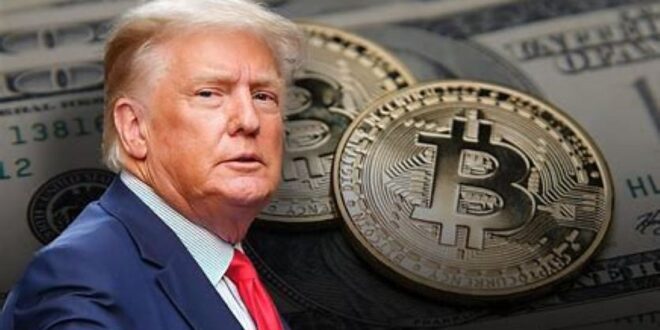In a stunning market reaction, Ether (ETH) has seen a dramatic 26% drop following the announcement of new tariffs by former U.S. President Donald Trump. The decision to impose economic sanctions has created turbulence in both traditional markets and the cryptocurrency space, leading to widespread panic selling, particularly among altcoins like Ether, which is the second-largest cryptocurrency by market capitalization.
The Impact of Trump’s Tariffs on Crypto
Trump’s recent tariff measures targeted a range of Chinese imports, including several key technology products. While the tariffs were originally designed to apply to traditional markets, the ripple effect has extended into the volatile world of cryptocurrencies. Investors have responded by pulling back from riskier assets, including digital currencies, which have been facing increased scrutiny in global markets.
The announcement sent shockwaves through the crypto community, leading to the immediate sell-off of Ether and other major cryptocurrencies like Bitcoin (BTC).
Market Reaction: Ether’s Sharp Decline
Ether, which had been performing relatively well over the past few months, experienced a sharp decline of over 26% in a matter of hours following the announcement of the tariffs. This marks one of the most significant drops for ETH in recent months, a stark contrast to its previous growth trend.
Several factors have contributed to Ether’s drop:
- Investor Panic: The crypto market is known for its high volatility, and any regulatory uncertainty or economic measure can trigger panic among investors.
- Wider Economic Fears: Trump’s tariffs, which target a broad range of global supply chains, have raised concerns about an economic slowdown, leading to decreased appetite for riskier assets like cryptocurrencies.
- Technological Concerns: The crypto mining sector, which has significant operations in China, could be impacted by the tariffs, potentially disrupting Ethereum mining and driving further downward pressure on prices.
The Broader Impact on the Crypto Market
Trump’s tariffs have not only affected Ether but have caused widespread volatility across the entire cryptocurrency market. Bitcoin, often seen as a “safe haven” in times of economic uncertainty, also experienced a dip, though it fared better than altcoins like Cardano (ADA) and Solana (SOL), which saw even steeper declines.
How Are Investors Reacting?
Investors are taking a cautious approach to crypto, with many opting to cash out their holdings and shift their assets to more stable investments such as gold, government bonds, or even traditional equities.
Some analysts have pointed to the lack of regulatory clarity around cryptocurrencies as a primary driver of the sell-off, while others believe that the global economic uncertainty triggered by the tariffs is causing fear-based selling.
The Role of Trump’s Tariffs in Shaping Crypto’s Future
Trump’s move is part of a larger pattern of geopolitical tensions influencing the crypto market. The announcement has reignited concerns about the growing influence of government regulations on cryptocurrencies, especially as the U.S. and China continue to clash over trade and economic policies.
While tariffs are typically associated with traditional financial markets, the crypto space has not been immune to their impact. As more governments look to regulate and impose tariffs on industries that intersect with digital currencies—like mining—investors may find themselves facing even more uncertainty in the near future.
What’s Next for Ether and the Crypto Market?
While the current market downturn has been harsh, some analysts believe that the dip could be temporary. As the dust settles around Trump’s tariffs, crypto prices may stabilize, and Ether could begin to recover. However, many are concerned that the ongoing economic tensions between major powers could lead to additional volatility in the crypto market.
Ethereum’s Future Post-Tariff Drop
Looking forward, Ethereum’s price trajectory may depend on several factors:
- Regulatory Clarity: Any progress in the U.S. or other global governments setting clear guidelines on crypto regulations could help ease investor fears.
- Technological Advancements: Ethereum’s transition to Ethereum 2.0, with its shift to proof-of-stake (PoS), may continue to bolster investor confidence in the long term.
- Market Sentiment: While the crypto space has seen a surge of new investors over the last year, the recent tariff-related panic has reminded the market that cryptocurrency is still prone to sudden shifts in investor sentiment.
Global Economic Uncertainty and Crypto’s Future
The fallout from Trump’s tariffs highlights the fragile relationship between global economic policies and the cryptocurrency market. As countries continue to grapple with inflation, trade tensions, and technological competition, digital assets will likely remain at the intersection of regulatory and financial pressure.
As the market moves forward, the key question remains whether cryptocurrencies can weather geopolitical storms or whether external events will continue to disrupt their growth. This latest drop in Ether’s price may be a temporary setback or a sign of more volatility ahead.
Trump’s tariffs have undeniably caused turbulence in the crypto market, with Ether bearing the brunt of the sell-off. Whether this decline marks the beginning of a broader market trend or is just a temporary dip remains to be seen. What is clear, however, is that the crypto space is highly susceptible to external pressures like global trade policies, and investors should remain cautious as they navigate the complexities of this volatile market.
 Business Sandesh Indian Newspaper | Articles | Opinion Pieces | Research Studies | Findings & News | Sandesh News
Business Sandesh Indian Newspaper | Articles | Opinion Pieces | Research Studies | Findings & News | Sandesh News



